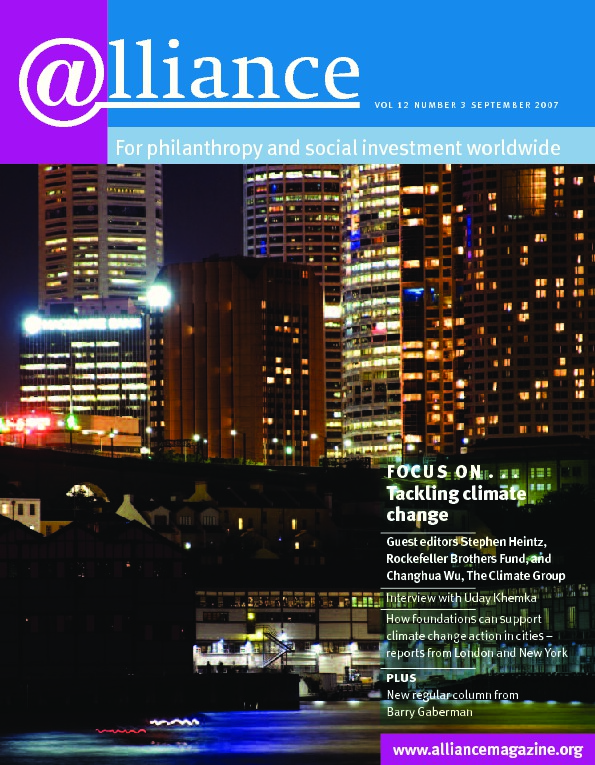There are no more profound manifestations of global interdependence than the single atmosphere that encircles our planet and the one-climate system that sustains all life on earth. But geopolitics and global economics condition us to conceive of the world as populated by developed and developing nations, and this dichotomy creates a very difficult context for efforts to combat global climate change. In this simplistic context, global warming is often seen as an aspect of global economic competition rather than an urgent matter requiring global cooperation.
Take the recent bit of headline news that China has now surpassed the US in greenhouse gas emissions. For some pundits and politicians, this provides ammunition to deflect consideration of critical US policy choices while shifting responsibility to China. But, as is often the case, the data, taken out of context, hides more than it reveals.
In fact, the average American still produces six times more greenhouse gas emissions than the average Chinese, while a very large percentage of Chinese emissions are produced manufacturing the flood of goods destined for American consumers. At the same time, the gap between rich and poor has been increasing in many developing countries, with the rich now consuming as much as or more than people in most developed countries. In a global economy, who bears ultimate responsibility?
There are no borders in our atmosphere, nothing to constrain the global distribution of CO2 molecules, no matter where they enter. The only sensible course is collaboration between developed and developing nations. Here is an area where the philanthropic community can build the necessary bridges. But how?
As this issue of Alliance goes to press, a new report provides some answers. Design to Win: Philanthropy’s role in the fight against global warming outlines a compelling strategy for winning the fight against global warming. ‘Philanthropists have a strong tradition of filling gaps,’ the authors write, ‘spurring step changes in technology and pursuing programming that transcends both national boundaries and economic sectors. Such capacities are exactly what are needed to tackle global warming.’
The report reinforces a central theme of this special issue of Alliance – that the present moment is crucial. If we don’t act boldly in the next decade, the authors conclude, we may lose the fight. What we do over the next five to ten years will permanently determine earth’s climate future. It seems that we have no choice but to depart from the trajectory of business as usual immediately. As the report puts it, we must obey ‘the First Rule of Holes: when you are in one, stop digging.’
Equally striking is the authors’ recommendation that philanthropies concentrate their global warming efforts geographically. The report identifies the US, the EU, China and India as the key targets. It also stresses the importance of preserving remote jungles in the Amazon, Congo and Indonesia because of their impact on carbon absorption. The authors present a well-reasoned strategy for these choices. Fundamental to it is close collaboration between developed and developing nations.
Their survey also took the measure of the financial resources philanthropy will need to commit in order to win the fight against global warming. Currently, they estimate that $200 million is devoted annually to climate issues. Additional funding of about $600 million a year is needed.
We can expect to see a heated international debate about the shape and scope of a post-Kyoto global mechanism. How will the US engage with the treaty? What will it take for large developing countries like China and India to make serious commitments to climate action? It will most probably require a combination of both obligatory and voluntary commitments, and also conditional commitments. Developing countries are sure to make steeper reductions if developed nations provide financial and technological support. Engaging in a discussion of conditional solutions has an added benefit: it would allow the parties to step away from a focus on thorny issues like per capita emissions and move everyone towards a more constructive international dialogue.
In this issue of Alliance we have endeavoured to show how philanthropic investments in climate work have yielded outsized results. Our authors have argued that the present moment is a turning point: what we do now will determine the fate of the planet. Design to Win, issued almost simultaneously with this issue, provides an extremely useful roadmap that makes action that much easier, and inaction that much more difficult.
Stephen Heintz is President of Rockefeller Brothers Fund. Email sheintz@rbf.org
Changhua Wu is the Greater China Director of the Climate Group. Email cwu@theclimategroup.org
For more information
Go to Alliance Online for more on Design to Win and other climate change resources.






Comments (0)